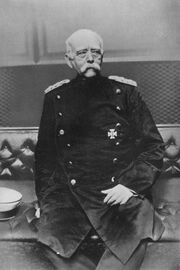| ||||||||||||||||||||||||||||||||||||||||||
Otto Eduard Leopold von Bismarck, Count of Bismarck-Schönhausen, Duke of Lauenburg, Prince of Bismarck, (1 April 1815 – 30 July 1898), was a Prussian German statesman and aristocrat of the 19th century. As Minister-President of Prussia from 1862–1890, he oversaw the unification of Germany. In 1867 he became Chancellor of the North German Confederation. When the second German Empire was formed in 1871 following the Franco-Prussian War, he served as its first Chancellor until 1890, earning the nickname "The Iron Chancellor". As Chancellor, Bismarck held an important role in the German government and greatly influenced German and international politics both during and after his time of service.
Literary comment
The following quotes, attributed to Bismarck, make occasional appearances in Harry Turtledove works, with a variety of wordings:
- "Laws, like sausages, cease to inspire respect in proportion as we know how they are made."
- "God protects fools, small children, and the United States of America."
Otto von Bismarck in In the Presence of Mine Enemies
Otto von Bismarck was designated as an honorary Führer of the Greater German Reich after the Second World War, taking his place in history beside Adolf Hitler, Heinrich Himmler, and Kurt Haldweim as one of the great leaders of Germany.[1]
Otto von Bismarck in Southern Victory
Upon the unification of Germany following the Franco-Prussian War in 1871, Otto von Bismarck pursued a foreign policy goal of isolating his country's primary enemy, France.[2] As part of this policy, he empowered his ambassador to Philadelphia, Kurd von Schlozer, to negotiate an alliance against France, Britain, and the Confederate States (later joined by Russia and a number of others) with the United States that eventually became the Central Powers alliance system.[3]
A city in the American state of Dakota was named for Bismarck.[4]
References
- ↑ In the Presence of Mine Enemies, pg. 200.
- ↑ See, e.g., How Few Remain, pg. 100.
- ↑ See, Ibid., pgs. 569-571, generally.
- ↑ The Victorious Opposition, p. 231, HC.
| Political offices (OTL) | ||
|---|---|---|
| Preceded by Adolf zu Hohenlohe-Ingelfingen |
Prime Minister of Prussia 1862–1873 |
Succeeded by Albrecht von Roon |
| Preceded by Albrecht von Bernstorff |
Foreign Minister of Prussia 1862–1890 |
Succeeded by Leo von Caprivi |
| New title Formation of the
North German Confederation |
Chancellor of the North German Confederation 1867–1871 |
Elevation to empire |
| New title Formation of the
German Empire |
Chancellor of Germany 1871–1890 |
Succeeded by Leo von Caprivi |
| Preceded by Albrecht von Roon |
Prime Minister of Prussia 1873–1890 | |
| ||||||||||||||||












